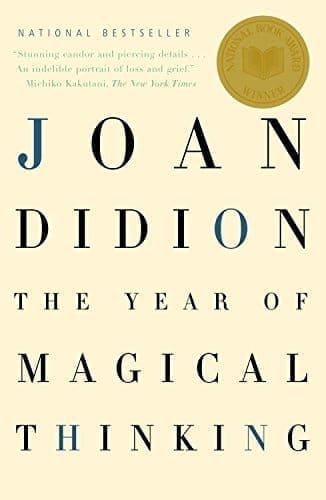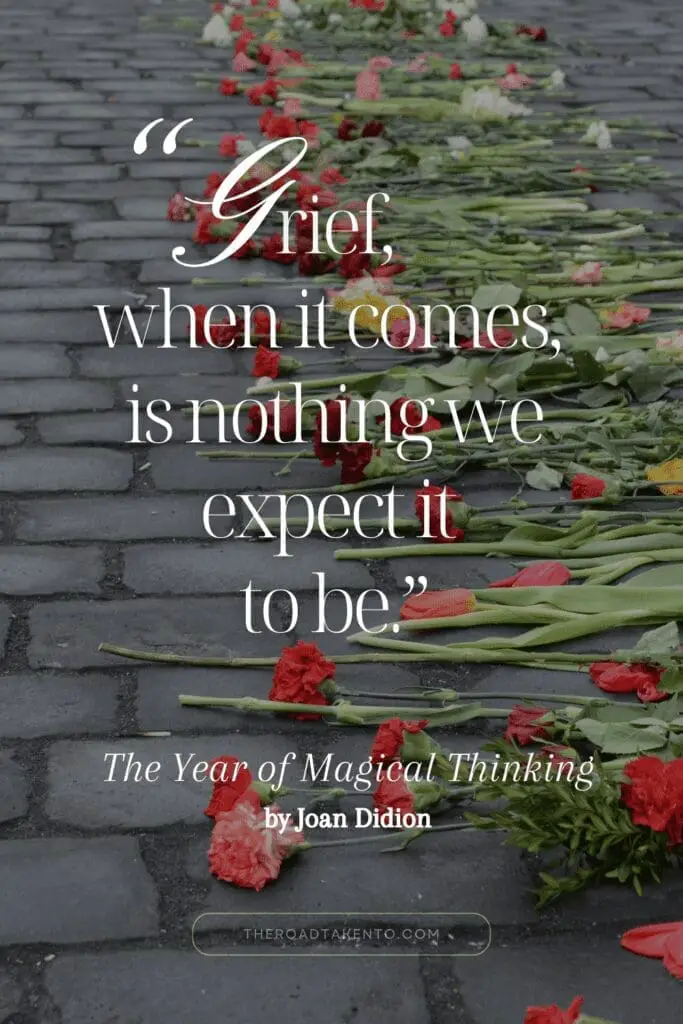I had never read any works by Joan Didion until I decided to buy The Year of Magical Thinking.
It was the title that made me do it. It sounded mysteriously inviting. Who wouldn’t want to spend a year swimming in a world of “magical thinking”?

The Year of Magical Thinking Quotes
While the book is about “magical thinking” and the elaborate tricks our mind can play on us, the book is about the strange art of coping with grief and death.
As an adult who has yet to experience the death and loss of someone truly close to me, I find myself thinking about death a lot. I think it’s because I want to be prepared when the moment and the shock of it comes. But, I don’t think any amount of thinking and reading can wholly prepare me for when fate comes knocking.
While I know that death is currently inevitable, I think my “magical thinking” keeps me from accepting the fact that every single member of my family and friends, myself included, will one day be dead. I know what the facts are, but that doesn’t stop my brain from imagining and believing in a scenario where we all never cease to exist on Earth.
One day though, I’ll find myself on the other side of magical thinking.
I’ll believe the ding on my phone is a text from them, I’ll think of our next vacation together and where we should go…I’ll want to share a funny story with them. Only to realize that I can’t do any of those things.
But until those sad, strange days come, there is something to be gained from all these depressing thoughts. That time isn’t here yet. Rather than dread family get-togethers because I’m feeling tired or put off opportunities to make new memories with my friends because I’m “too busy,” I can embrace these chances.
Don’t live life in a blur.
As Joan Didion writes in the last line of The Year of Magical Thinking, “You had to feel the swell change, You had to go with the change.”
The year of magical thinking quotes
20 The Year of Magical Thinking Quotes with Page Numbers
The Year of Magical Thinking Quotes
1. “Did he have some apprehension, a shadow? Why had he forgotten to bring note cards to dinner that night? Had he not warned me when I forgot my own notebook that the ability to make a note when something came to mind was the difference between being able to write and not being able to write? Was something telling him that night that the time for being able to write was running out?” Chapter 2, pg. 23

2. “Grief, when it comes, is nothing we expect it to be.” Chapter 2, pg. 26
3. “After my mother died I received a letter from a friend in Chicago, a former Maryknoll priest, who precisely intuited what I felt. The death of a parent, he wrote, ‘despite our preparation, indeed, despite our age, dislodges things deep in us, sets off reactions that surprise us and that may cut free memories and feelings that we had thought gone to ground long ago. We might, in that indeterminate period they call mourning, be in a submarine, silent on the ocean’s bed, aware of the depth charges, now near and now far, buffeting us with recollections.’” Chapter 2, pg. 27
4. “Grief is different. Grief has no distance. Grief comes in waves, paroxysms, sudden apprehensions that weaken the knees and blind the eyes and obliterate the dailiness of life.” Chapter 2, pg 27
5. “I needed to be alone so that he could come back. This was the beginning of my year of magical thinking.” Chapter 2, pg. 33
6. “You sit down to dinner and life as you know it ends. In a heartbeat. Or the absence of one.” Chapter 5, pg. 63
7. “People who have recently lost someone have a certain look, recognizable maybe only to those who have seen that look on their own faces.” Chapter 5, pg. 74
8. “Why, if those were my images of death, did I remain so unable to accept the fact that he had died? Was it because I was failing to understand it as something that had happened to him? Was it because I was still understanding it as something that had happened to me?” Chapter 6, pg. 77
9. “She was always anxious before a trip. Decisions about what to pack had seemed since childhood to trigger some fear of lost organization.” Chapter 7, pg. 86
10. “I realized that the answer to the question made no difference. It had happened. It was the new fact on the ground.” Chapter 9, pg. 100
11. “Would I need to relive every mistake?” Chapter 11, pg. 132
12. “Until now I had been able only to grieve, not mourn. Grief was passive. Grief happened. Mourning, the act of dealing with grief, required attention.” Chapter 12, pg. 143
13. “Why didn’t I listen when he said we weren’t having any fun? Why didn’t I move to change our life?” Chapter 16, pg. 186
14. “Grief turns out to be a place none of us know until we reach it.” Chapter 17, pg. 188
15. “Nor can we know ahead of the fact (and here lies the heart of the difference between grief as we imagine it and grief as it is) the unending absence that follows, the void, the very opposite of meaning, the relentless succession of moments during which we will confront the experience of meaninglessness itself.” Chapter 17, pg. 189
16. “These fragments I have shored against my ruins, were the words that came to mind then. These fragments mattered to me.” Chapter 17, pg. 190
17. “ ‘A single person is missing for you, and the whole world is empty,’ Philippe Ariès wrote to the point of this aversion in Western Attitudes toward Death.” Chapter 17, pg. 192
18. “We are imperfect mortal beings, aware of that mortality even as we push it away, failed by our very complication, so wired that when we mourn our losses we also mourn, for better or for worse, ourselves. As we were. As we are no longer. As we will one day not be at all.” Chapter 17, pg. 198
19. “I have trouble thinking of myself as a widow. I remember hesitating the first time I had to check that box on the “marital status” part of a form. I also had trouble thinking of myself as a wife.” Chapter 19, pg. 208
20. “I know why we try to keep the dead alive: we try to keep them alive in order to keep them with us. I also know that if we are to live ourselves there comes a point at which we must relinquish the dead, let them go, keep them dead.” Chapter 22, pg. 225
The Year of Magical Thinking Quotes
Related Posts:
